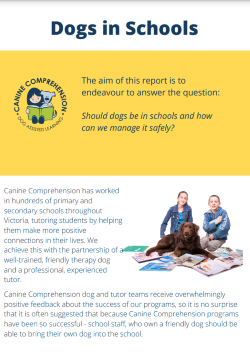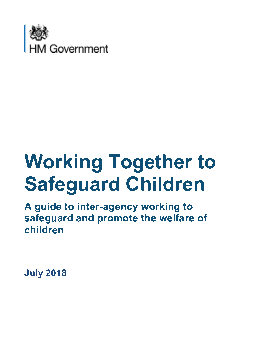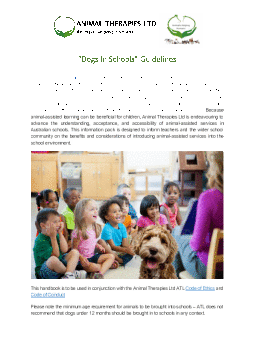
Required Documents for Program Engagement
When running our programs, schools are required to complete several forms to ensure a smooth and effective experience for all participants.
These include pre-evaluation forms, which help us tailor the program to meet the specific needs of your students. Additionally, progress reports are to be filled out regularly by our mentors and shared with each school to track student development and engagement throughout the program. At the conclusion of the program, post-evaluation forms are necessary to assess the overall impact and success.
Furthermore, obtaining permission for photographs and consent to participate is essential to ensure compliance with ethical guidelines and respect for student privacy.
Completing these forms with accuracy and timeliness allows us to provide the best support and make any necessary adjustments to enhance the program's effectiveness. Your cooperation in this process is greatly appreciated and contributes significantly to the positive outcomes for your students.
Take a look at what makes a favourite school:
What Makes a Favourite School: Insights from Our Mentors
Evaluations for Primary and Secondary Schools
Pre-evaluation forms will be accessible on this page during the week 1 of each term and available here until week 3 of the term. They should be completed during the initial session with the mentor present.
Post-evaluation forms will be accessible from week 7 of each term. They should be completed during the session with the mentor present.
Evaluation Forms |
Forms Available |
|
Pre Evaluation form for Primary Schools |
|
|
Pre Evaluation form for Secondary Schools |
Click here for the Pre Evaluation form for Secondary Schools |
|
Post Evaluation form for Primary Schools |
|
|
Post Evaluation form for Secondary Schools |
Click here for the Post Evaluation form for Secondary Schools |
Additional Forms
Online Student Photo and Consent Permission Form
Parent Support
Compliance
- WorkCover Insurance Certificate of Currency
- Combined Insurance Certificate
- Safe Work Methods Statements (SWMS)
- Risk in classrooms assessment
- Venue Animal Management Plan
Supervision from the school is necessary.
Legal supervision is a top priority. A school representative must be present for each session without exception. We have found that continuity with familiar staff enhances the program's effectiveness for adults and students. We collaborate closely with schools to maintain a secure and enriching environment, adhering to stringent safety and well-being standards. The care and security of your students are our highest priorities.
Working With Children's Checks
All staff hold a WWCC and can provide evidence when required.
Canine Comprehension ensures that its staff entering School premises:
(i) have undertaken a satisfactory working with children check; and
(ii) have met any additional relevant legal requirements and policies of the School Council and/or School about the suitability of mentors to work with school children or within the precinct of the School.
Canine Comprehension acknowledges and agrees that Schools are committed to creating child-safe environments and protecting students from abuse or harm in the school environment, managing the risk of child abuse, providing support to a child at risk of child abuse and responding to incidents or allegations of child abuse in accordance with their legal obligations, including Child Safety Laws.
Canine Comprehension acknowledges that the School Council and School Staff must comply with Child Safety Laws, the Ministerial Order and School Council Child Safety Policies.
Policies
Late fees and further action
- Bookings are confirmed upon receiving session times.
- Cancellation may incur a 20% administration fee of the original booking cost.
- Outstanding accounts may be transferred to debt recovery professionals or may initiate legal action.
- Legal costs will be added to the outstanding amount.
- Additional charges for interest, recovery, and legal expenses may be sought and awarded by the court if the account remains unpaid.
Change of session
- We cannot guarantee that a change will be possible due to mentor availability.
- If rescheduling is viable, a $22.00 Flexi charge will apply to cover administration costs.
Cancellation policy
- Please attend scheduled appointments as arranged.
- Makeup sessions are scheduled for public holidays.
- Cancellations require a two-week notice. We will attempt to reschedule; however, if not possible, the session will be forfeited.
- To cancel, please email admin@caninecomprehension.com.au.
Safety Statements
- Commitment to Child Safety Statement
- Inappropriate Behaviour Prevention Statement
- Inclusion Statement
- Behaviour Management Statement
- Dog Safety Statement
- LGBTIQ Support Statement
- OHS Consult Comms Procedure
- School Policy and Advisory Guide
- Health, Safety and Wellbeing Policy
- Child Safe Policy
- Child Safe Responding & Reporting Policy
Canine Comprehension recognises that their service delivery is bound by the following policies deemed relevant by the Principal / Director of the school to the delivery of the Services, on the basis that the Principal / Director provides these documents in written form at least 2 weeks before services commence (where necessary) an orientation and explanation is provided to the Supplier of what is expected to conform to these policies:
(i) Student Support Group Guidelines;
(ii) Primary Welfare Officer Initiative Guidelines;
(iii) Schoolcare Program Guidelines;
(iv) Medical Intervention Support Guidelines;
(v) The Victorian Prevention and Health Promotion Achievement Program (Primary schools);
(vi) Promoting Healthy Minds for Learning and Living (Victorian Mental Health Reform Strategy);
(vii) Protecting the safety and well-being of children and young people (protocol);
(viii) A step-by-step guide to making a report to Child Protection or Child FIRST;
(ix) Guidelines for the management of student services files;
(x) any of the School Council’s rules, regulations, protocols, procedures, by-laws and any other relevant information of which the Canine Comprehension has been notified.
School Mental Health Menu to fund our programs
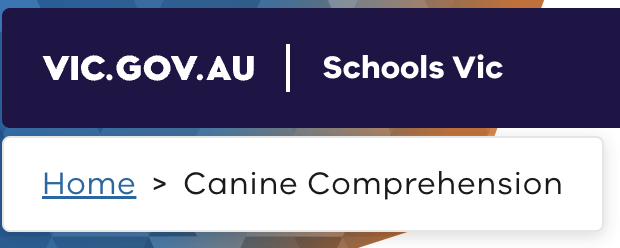
DET Funding Details below, or go to the DET website
Tier:
- Tier 1: Positive Mental Health Promotion
- Tier 2: Early Intervention Cohort Specific Support
Type of Intervention: Animal wellbeing programs
Stength of evidence: Level 3: Foundational and emerging evidence for program.
Geographic Availability: State-wide, rural/regional
Intended Outcomes
- Improve students interpersonal and social skills
- Improve students emotion management
- Enable better connections at school
Program Details
- Enhance student interpersonal and social skills.
- Improve emotional management in students.
- Foster better connections within the school environment.
Program Details:
Target Audience:
- Primary School Students - lower
- Primary School Students - upper
- Secondary School Students - lower
- Secondary School Students - upper
- Aboriginal and Torres Strait Islander Students
- LGBTIQ+ Students
- Asylum Seeker and Refugee Students
- Students with Disabilities
Program Provider: Canine Comprehension
Delivery Mode:
- Face-to-face
- Combination
- One online session is available to make up a missed face-to-face session
Implementation considerations
- Target population: Students in P-12 who have a broad spectrum of needs and personalities.
- Program adaptability: Programs are written in a manner that allows tutors to change and amend the program to suit the needs of the group. Different program options allow schools to select the most relevant content for their students.
- Staffing: One school staff member needs to be present for each session, observing and sometimes participating in the session.
- Training requirements: There is no pre-requisite training. The use of a quiet room where there is enough space for the participants to sit in a large circle is required.
- Factors to consider: Maximum of 10 students per group.
- Australian context: The program is not available in Western Melbourne Wimmera South West and Barwon South West regions: Southern Melbourne South East region: Hume Moreland, Loddon Campaspe and Mallee North West regions or any of the North East regions.
Evidence
Program Evaluation Statement
Literature Reviews
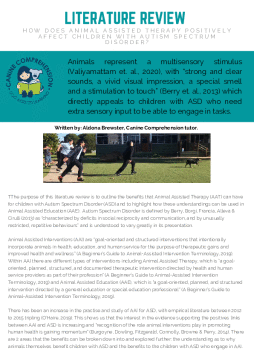
ASD Literature Review
How does Animal Assisted Therapy Positively Affect Children with Autism Spectrum Disorder
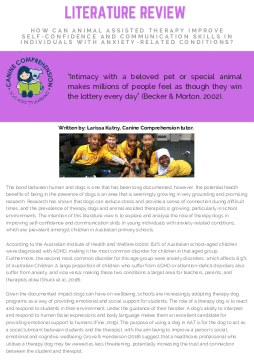
Human & dog connection Literature Review
How can animal assisted therapy improve self-confidence and communication skills in individuals with anxiety-related conditions?
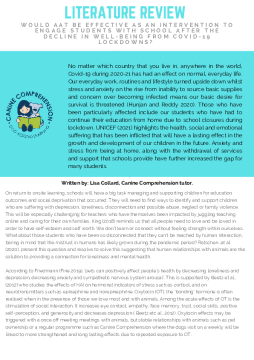
AAT as an intervention during COVID-19 lockdowns Literature Review
Would AAT be effective as an intervention to engage students with school after the decline in well-being from COVID-19 lockdowns?
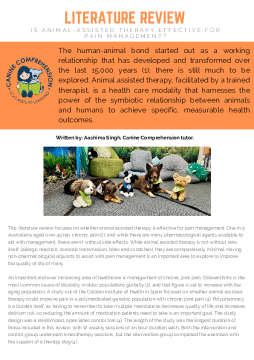
Is animal assisted therapy effective for pain management Literature Review
Animal assisted therapy, facilitated by a trained therapist, is a health care modality that harnesses the power of the symbiotic relationship between animals and humans to achieve specific, measurable health outcomes.
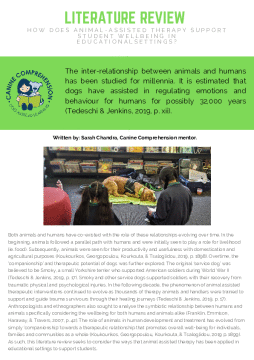
How does animal assisted therapy support student wellbeing in educational settings Literature Review
It is estimated that dogs have assisted in regulating emotions and behaviour for humans for possibly 32,000 years.
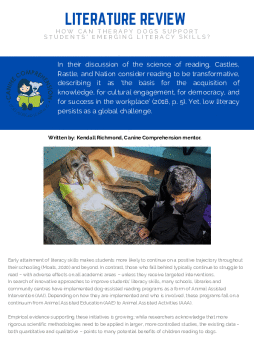
How can therapy dogs support students’ emerging literacy skills Literature Review
Early attainment of literacy skills makes students more likely to continue on a positive trajectory throughout their schooling and beyond.
Articles
Randomised control traials: Evidence from published systematic reviews and randomised controlled trials (RCT).
The purpose of this study was to investigate the effects of animal-assisted therapy on the anxiety and school attendance of students with disabilities in a middle school language and learning disabled classroom.
Mindfulness practices with and without a dog.
The aim of this study was to qualitatively explore children’s experiences of learning mindfulness in school, with and without a dog.
Friesen, L. Exploring Animal-Assisted Programs with Children in School and Therapeutic Contexts. Early Childhood Educ J 37, 261–267 (2010). https://doi.org/10.1007/s10643-009-0349-5
Animal-assisted programs, particularly those involving therapy dogs, are increasingly popular in educational and therapeutic settings, offering children physiological, emotional, social, and physical support. This article highlights the benefits and concerns associated with such programs, emphasizing the unique role of therapy dogs as non-judgmental companions providing valuable social and emotional support to children in these environments.
students with disabilities Theses and Dissertations. 2669.
This study aimed to examine the impact of animal-assisted therapy on anxiety and school attendance among students with disabilities in a middle school language and learning disabled classroom, using a single-subject design with ABAB phases. Participants engaged in animal-assisted therapy during science class, with anxiety levels assessed using Ottawa-Georgia stress scales and attendance tracked via daily rosters. Findings indicate a reduction in anxiety levels and improved attendance with high satisfaction reported among students for the use of animal-assisted therapy.
reading and social/emotional skills of selected primary school students.
This study explored the effectiveness of the Delta Society Classroom Canines™ program in enhancing reading and social/emotional skills among selected students in a Queensland primary school. Utilising both quantitative and qualitative data, including reading scores, attendance records, observations, and interviews, findings suggest positive impacts on student motivation, reading proficiency, confidence, and self-esteem.
Articles that mention research
Dogs - our best friends when it comes to mental health therapy
Dogs may be a better ‘therapist’ for young people when they are part of a psychotherapy session rather than a waiting-room companion

The effectiveness of animal-assisted therapy on the anxiety and school attendance of students with disabilities
The purpose of this study was to investigate the effects of animal-assisted therapy on the anxiety and school attendance of students with disabilities in a middle school language and learning disabled classroom.
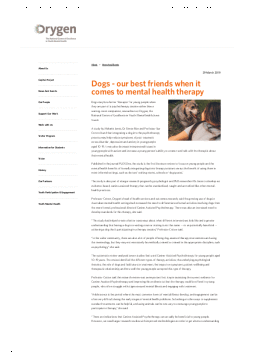
Dogs - our best friends when it comes to mental health therapy
Dogs may be a better ‘therapist’ for young people when they are part of a psychotherapy session rather than a waiting-room companion

Mindfulness practices with and without a dog.
The aim of this study was to qualitatively explore children’s experiences of learning mindfulness in school, with and without a dog.

IAHAIO research the Meaning and Motivation of Children Participating in AAI
The purpose of this research is to explore the meaningfulness and motivation animal-assisted therapy interventions provide for pediatric clients when compared with traditional occupational therapy treatment.

IAHAIO research AAI for Children with Autism Spectrum Disorders
Our survey of animal-assisted interventions (AAI) offered by French intervention facilities aimed to examine and describe the range of AAI for autism spectrum disorder (ASD) children.
Schools Frequently Asked Questions
General FAQs
Where can I find the program overviews and what locations do you operate in?
You can find detailed program overviews on our website. We operate throughout Victoria, Australia in various locations to accommodate your needs.
Can you adapt the curriculum to suit individual group needs and run programs in specialist schools?
Yes, we tailor our curriculum to meet the unique needs of each group and are experienced in running programs in specialist schools.
What do the therapy dogs do in sessions and what if a child is afraid of or allergic to dogs?
Therapy dogs create a calm, supportive environment, helping with emotional regulation and engagement. If a child is afraid of or allergic to dogs, we can discuss alternative arrangements to ensure everyone is comfortable.
Where in the school is the program run and what type of space is needed?
Programs are typically run in a quiet, private space of at least 8m x 8m where students feel safe and comfortable. Having an outside option can also be beneficial. We can adapt to various school environments.
Who needs to know the dogs are coming to the school?
Please inform the entire school community, especially teachers and caregivers, about the visit to ensure a smooth experience.
We encourage schools to proudly advertise our presence in your community, showcasing the benefits we provide through photos on websites, reflections in newsletters, and other communications.
What materials do the students need to bring and how does the program fit around our school timetable?
Students do not need to bring any materials; we provide everything necessary. We work with your school’s timetable to ensure minimal disruption.
How long does a program run, and when do programs start?
Programs typically run for 50 minutesr per session, starting at the scheduled time and lasting for the duration agreed upon. Our programs usually begin week 2 of each term and run for 8 weeks.
Why is the 10-student maximum so important?
The maximum number of students per group is 10 to ensure each student receives personalised attention and support.
What if my school's student numbers are much more significant?
We can discuss options to accommodate larger groups, such as our dog for the Day programs or our Packages options, ensuring all students benefit from the program.
Booking FAQs
What happens when I submit a booking form and can I arrange a meeting with Canine Comprehension and decision-makers?
After submitting a booking form, we will contact you to confirm details and schedule the session. Yes, we can arrange meetings to discuss the program and address any questions.
On the Day FAQs
Where shall the supervising staff member meet and do you need supervision from the school?
The supervising staff member can meet us at reception or the designated session area. Yes, we require a staff member to be present during the sessions to ensure safety and support.
Could you let me know if you are insured and what do we need from you?
Yes, we are fully insured. Our compliance documents are easily available here. We handle all session materials and set up to ensure a smooth and enjoyable experience.
Terms & Conditions FAQs
How much do the programs cost and are there any hidden charges?
Program costs vary; please contact us for specific pricing. There are no hidden charges; all costs are transparent and communicated upfront.
What is your cancellation policy and how are your services appropriate for our students?
Cancellations require a 2-week notice. Late fees may apply if notice is not given in time. Our services are designed to meet diverse needs and are suitable for most students.
After the Program FAQs
How do I give feedback and is there any follow-up information we could send to parents/guardians?
You can provide feedback through our website or by contacting us directly. Yes, we can provide follow-up information to keep parents/guardians informed about their child's progress.
How can I refer a student for individual mentoring?
Referrals can be made through our website or by contacting our office. We are here to support you every step of the way.


